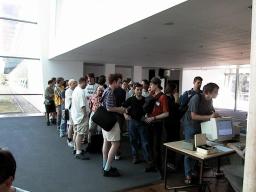
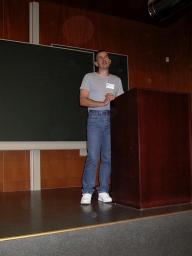
The Debian people start counting from zero. Debian Conference 1 was the second big international meeting for this voluntary, at the same time anarchistic but focused group of developers. Like last year, the conference was part of the Libre Software Meeting in Bordeaux, France. This time it started a few days earlier than the other topics of LSM thus being more clearly an event in itself.
See also:

|
The registration started at about 9.30 and lasted until midday - the organisation had improved since last year but paying for the rooms and food tickets took its time. On the side people got to the real business, exchanging GPG keys. |

|
Thierry Laronde opened the conference opened at 14.30 in front of the 74 people so far registered in. "There's generally more noise than signal - the signal is the aim of the Debian Conference 1". |
The topic of the first afternoon was "Speech from the throne". Thierry began by announcing that the first Woody freeze had just begun (the process leading to the next stable version of Debian). Then the discussion drifted to the somewhat depressing topic of software patents and how to avoid their dangers in Europe. Two of the early Debian project leaders had been invited as special guests but unfortunately had to cancel their trip at the last minute. When nobody had the courage to step in the front and warm up the audience people headed soon towards the hacking rooms to check their email.
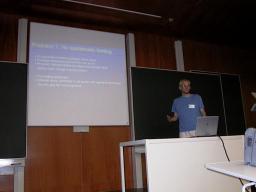
|
Martin Michlmayr gave a presentation about quality assurance in the Debian project which induced a lively discussion. Most packages are maintained by people that really care about them and achieve very high quality but at times somebody loses interest or system breaks due to unexpected conflicts. As Debian grows the testing procedures and ways to treat problems have to become more systematic - without destroying the innovation and spirit of course. |
The "Testing" distribution was introduced to shorten the cycle between stable versions and to give people a possibility to "live on the edge" without having all the unevitable problems of unstable. Martin proposed that packages would move from unstable to testing only after somebody says they're ok. Some others thought that this would get the testing three more outdated and render its role less effective. Quickly changing library versions also cause problems so it is difficult to say when the package is good.
Two other controversial questions were stricter acceptance control for new programs and dividing packages into different priority classes. Everybody agrees that the release cycle should be made quicker and lengthy delays waiting individual packages avoided but prioritizing and pushing people raises many social issues. Some tools have recently been written to make the technological side easier, namely automatic detection of dependency problems and a database surveying contacts with slow or non-active maintainers.
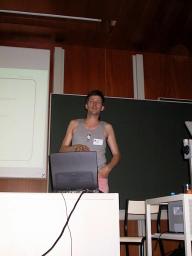
|
System administrators in charge of dozens of computers will warmly welcome Thomas Lange's latest achievement. The Fully Automatic Installation provides a flexible method of installing Debian without any manual intervention. Besides clusters with identical nodes FAI is suitable for more diverse environments thanks to it's class structure of configuration files. |
Day three was reserved for topics which are willing change the very core of the system: in a couple of years the GNU/Linux may be just one among several Debian variants suitable for different tasks.
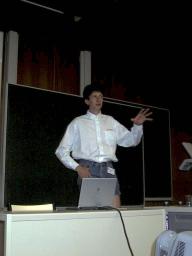
|
Andreas Schuldei wants to combine the security of OpenBSD with the manageability and useability of Debian. The OpenBSD project has undertaken a huge and tedious task of auditing the code of kernel code and certain popular server programs. Their approach is to have a small system where security goes ahead end user convenience in the cases these are in conflict. Debian is happy to welcome new software and this is not likely to change so the solution would be to propose a certain set of packages considered secure along with the OpenBSD kernel. |
The differences in philosophy between the two projects go much further than just security and technological issues. The Debian community largely prefers GNU tools and the protective GNU General Public License while the BSD people prefer having a less restrictive license which allows not only modifications under the same conditions but proprietary extensions as well. Andreas's background is in Debian but has already found some interested people in the OpenBSD group so we can hope for a beneficial collaboration for both.
The latter part of the morning was reserved for the official opening of the Libre Software Meeting, I've written about that in my LSM report.
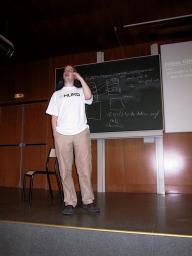
|
Marcus Brinkmann gave a thorough and technical presentation of the Hurd kernel architecture and current state of the project. I was silently wondering on which system he was running the slideshow when the battery ran out and Marcus had to boot his laptop. It was Hurd indeed, a good sign how the project has progressed since last year. |
The Hurd has lots of nice features that will become increasingly important as computing moves to the network. Authentication server based access control system is very flexible and normal users can mount network file systems on the fly and replace many other services that have traditionally been low level implementations in the kernel. The system still needs time to mature but we got a nice taste of what the future might look like.
The Hurd is also a good example of one major strenght of free software - reusability. The drivers written for the Linux kernel have been used in many cases with very small modifications. The developers are happily using Linux for everyday tasks while believing that their design is better and results in a superior system in the long run.
Preparing the Debian GNU/Hurd distribution needs some architectural changes across the whole infrastructure. For instance makedev is binary-all, but works only on the Linux kernel, and Marcus has proposed a new binary-all-linux definition. The change seems small but is actually pretty big because almost all the tools (dpkg for example) need at least small changes to conform to the new structure. This would naturally also help the Debian/OpenBSD project.
Cyrille Chepelov wrote a funny short story about DHCP problems that people had in the hacking rooms in the afternoon.
On Thursday most other topics of the Libre Software Meeting were just starting but it was the last day of the Debian Conference. The first presentation was by Thomas Marteau, Xavier Debacker and Matthieu Delahaye about porting Debian to the HP PA-RISC architecture. In this case porting the Linux kernel and the initial userland applications is obviously the hard part, adding the new architecture to Debian much simpler.
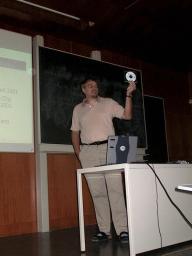
|
Christoph Lameter told the story of his Telemetry Box. It is a small Debian distribution that turns a PC to a network diagnostic tool. The presentation concentrated on the use of Debian in a business context. One key point to success was to market the product as an appliance without any mention of Linux or Debian. Once the companies find out that the thing works and ask how it is done you can tell them. The users also want to see immediate results, so the Telemetry Box installation asks very few questions thus being different with the general Debian philosophy to do it. |
Christoph also gave an informative presentation on the Hype and Reality of Open Source Business Models in the law, economy and politics track. Another talk not directly part of the Debian Conference but related to it was Andreas Tille's introduction to the Debian packaging system for the Medicine topic. People can be very skilled in their own speciality but less experienced in system administration and unaware that modern packaging of software could make installation and upgrades significantly easier than it currently is for many specialized programs.
Thursday afternoon it was the time to close the Debian conference. Although this report concentrates on the presentations the whole event was much more. Neil Walfield summarized what many others felt too: people become more than just words in emails when you see their faces. James Bromberger noted that there were three times more packages than normally in the Debian incoming directory. The developers had really been active in the hacking rooms, often coding until 4 am. Discussions in small groups helped especially in solving problems that are of social rather than technical nature.
There seemed to be a consensus that the Debian Conference should be organized once a year. Thierry threw the ball to the audience saying that he doesn't want to do it third time, while of course willing to share his experience and give advice. In addition to a group of hard-working people the organization needs material support to ensure cheap accommodation and meals. In Bordeaux being part of LSM had helped a lot and this kind of model was seen the most probable solution for the future too.
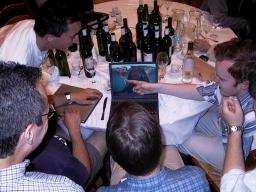
|
In the evening LSM people went to "Libre supper" in a local restaurant that was reserved for us. Edward Betts calculated the optimal place for the next conference using the coordinates of the Debian developers. First on a flat map it seemed to be near Portugal but after switching to polar coordinates he found out that the Debian Developers Centre of Mass is in the middle of Greenland. See you there next year, right? |
I have some additional notes of the talks on-line. Then there are tons of pictures and additional material available around the net, check out these links:
Last update 21.08.2001.